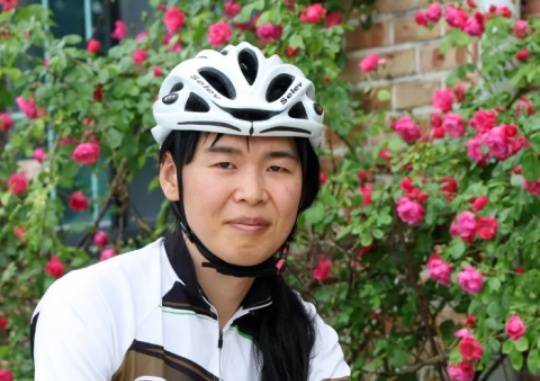Na Hwa-rin, a Transgender Cyclist, “I Want to Stir Controversy”
이 글자크기로 변경됩니다.
(예시) 가장 빠른 뉴스가 있고 다양한 정보, 쌍방향 소통이 숨쉬는 다음뉴스를 만나보세요. 다음뉴스는 국내외 주요이슈와 실시간 속보, 문화생활 및 다양한 분야의 뉴스를 입체적으로 전달하고 있습니다.

A Korean cyclist who underwent sex reassignment surgery from a man to a woman will compete as a female athlete in an official competition. Na Hwa-rin (37), who received the surgery a year ago, said, “I want to stir controversy.”
In an interview with the Kyunghyang Shinmun conducted over the phone on June 1, Na said, “This weekend, I will compete in three categories in women’s cycling at the Gangwon-do Sports Festival in Yangyang.” She said, “I have undergone feminizing hormone therapy since 2008,” and explained, “My female hormone levels are lower than the normal woman.” The first number in the second half of her resident registration number was also changed from one (for men) to two (for women).
Overseas, athletes who underwent gender-affirmation surgery often tried to compete in cycling and track and field competitions and stirred considerable controversy. Na will be the first athlete with a history of sex-reassignment surgery to compete in South Korean cycling. Na Hwa-rin is an excellent athlete, who previously took first place in four categories in men’s cycling at the Gangwon-do Sports Festival in 2012, including the 1 km individual pursuit and 4 km race. She has an imposing body, standing 180 cm tall and weighing 72 kg. She has 32.7 kg of skeletal muscle, which is much higher than the female average of 20-22 kg.
Na currently runs an asparagus farm in Cheolwon, Gangwon-do. She said, “I’ve wanted to be a girl since I was young,” and added, “I waited 36 years and got the surgery after I secured a means to live on my own.”
Last March, Emily Bridges (21), a transgender cyclist in the U.K. received a notice that she could not compete in a competition from the Union Cycliste Internationale (UCI), because it could trigger a problem over fairness with other female athletes. Transgender women taking part in competitions have sparked a heated debate in other sports as well, such as swimming, track and field, rugby and weightlifting. International sports organizations require athletes to keep their male hormone—testosterone--levels below a certain standard, but the debate continues. As for the Gangwon-do competition, Na said, “I am well aware that if I get a medal, I will not receive the public’s empathy or recognition and that it will not be honorable,” and added, “But I wanted to let the world know that I, once a man now a woman, clearly exist.” She said, “By putting my life on the line in this competition, I wanted to discuss differences not discrimination.” She further said, “I am trying to squeeze in to make room for sexual minorities in categories that are split into male and female.”
If Na is selected as a Gangwon-do representative in the upcoming competition, she will be able to compete in the National Sports Festival. The regulations for competing in the National Sports Festival organized by the Korean Sports and Olympic Committee only mentions men and women who are Republic of Korea nationals and do not mention transgenders. So, in fact, there is no ground to prohibit Na from competing. Na said, “If by competing in the National Sports Festival, I am seizing another person’s opportunity to compete, I would think hard about it. But if not, I will gladly step onto the stage of the National Sports Festival.”
Copyright © 경향신문. 무단전재 및 재배포 금지.
- [속보]코스피, 이란발 충격에 5093.54로 마감···698.37P 폭락, 하락률도 역대 최대
- [속보]‘36주 낙태’ 산모 집행유예…“국가가 임신·출산 위한 사회 조건 개선했어야”
- 이 대통령 “검찰 증거조작, 살인보다 더 나빠”…‘이재명에 돈 준 사실 없다’는 취지 녹취 인
- ‘세관 직원 마약 연루 의혹’ 사실무근 종결···수사 주도 백해룡 경정 고소 검토
- [단독]“삼성 믿고 공장 옮겼는데 발주 중단”···공정위, 삼성전자 하도급법 위반 조사
- 총리급 위촉 박용진 “내가 ‘뉴이재명’? 고맙게 생각···난 ‘비명’ 아니고 ‘이재명 사람’
- [속보] 민주당, 박찬대 인천광역시장 후보 단수 공천
- 이 대통령, 필리핀 수감 ‘한국인 마약왕’ 임시인도 요청…“한국서 처벌해야겠다”
- 박수현 “신문 읽다 하도 역겨워, 헌법 뒤 숨으면 썩은 냄새 사라지나”…조희대 사퇴 압박
- [단독]10분 남짓 거리에 고속도로 통행료가 2번?···포항~동해안 운전자 ‘분통’